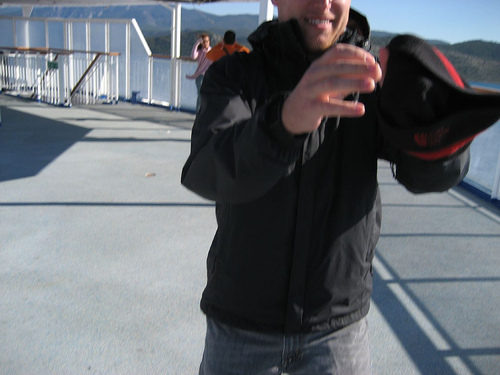Stewart Brand had an excellent article recently on Environmental Heresies. In it he sought to promote the idea that the "environmental movement will [over the next ten years] reverse its opinion and activism in four major areas: population growth, urbanization, genetically engineered organisms, and nuclear power." While I found the entire article quite fascinating, I was particularly interested in some of his points on population growth and urbanization.
Take population growth. For 50 years, the demographers in charge of human population projections for the United Nations released hard numbers that substantiated environmentalists’ greatest fears about indefinite exponential population increase. For a while, those projections proved fairly accurate. However, in the 1990s, the U.N. started taking a closer look at fertility patterns, and in 2002, it adopted a new theory that shocked many demographers: human population is leveling off rapidly, even precipitously, in developed countries, with the rest of the world soon to follow. Most environmentalists still haven't got the word. Worldwide, birthrates are in free fall. Around one-third of countries now have birthrates below replacement level (2.1 children per woman) and sinking. Nowhere does the downward trend show signs of leveling off. Nations already in a birth dearth crisis include Japan, Italy, Spain, Germany, and Russia—whose population is now in absolute decline and is expected to be 30 percent lower by 2050. On every part of every continent and in every culture (even Mormon), birthrates are headed down. They reach replacement level and keep on dropping. It turns out that population decrease accelerates downward just as fiercely as population increase accelerated upward, for the same reason. Any variation from the 2.1 rate compounds over time.(emphasis mine)
That’s great news for environmentalists (or it will be when finally noticed), but they need to recognize what caused the turnaround. The world population growth rate actually peaked at 2 percent way back in 1968, the very year my old teacher Paul Ehrlich published The Population Bomb. The world’s women didn’t suddenly have fewer kids because of his book, though. They had fewer kids because they moved to town.
Cities are population sinks-always have been. Although more children are an asset in the countryside, they’re a liability in the city. A global tipping point in urbanization is what stopped the population explosion. As of this year, 50 percent of the world’s population lives in cities, with 61 percent expected by 2030. In 1800 it was 3 percent; in 1900 it was 14 percent.
The environmentalist aesthetic is to love villages and despise cities. My mind got changed on the subject a few years ago by an Indian acquaintance who told me that in Indian villages the women obeyed their husbands and family elders, pounded grain, and sang. But, the acquaintance explained, when Indian women immigrated to cities, they got jobs, started businesses, and demanded their children be educated. They became more independent, as they became less fundamentalist in their religious beliefs. Urbanization is the most massive and sudden shift of humanity in its history.
A full half of the world's population lives in cities at this point. As responsible Christians, we simply cannot choose to ignore this fact. And yet it seems that cities remain the most morally base part of our societies - the areas where faith flourishes least. I don't intend to claim that we are indeed losing the battle, however it is clear that we at the least have our work cut out for us - especially as the population shift towards city-dwelling continues to grow so rapidly. One could perhaps argue that our responsibility to the cities is exponentially more than Paul's driving duty was.
New York, like most large cities, offers as one of its greatest attractions the incredible array of various world cultures, all forced into just a few square miles. A mini-planet, of sorts; world accessibility on a whole new level. You can walk from China Town to Little Italy to K-town, from Spanish Harlem to, well, Harlem. The Jews have their Garment District with its kosher delis, the Arabs sit just north in their Diamond district, and falafels are fresh cooked by sidewalk vendors. They're all here, and there's something else, too. In addition to the ethnic smorgasborg, the Christian is presented with an entirely new dish - a person who knows no outside world, but who comes from city folk himself. As each year passes, more and more are handed a genealogy that is comprised more primarily and recently of city dwellers themselves, as opposed to cultures developed in the historically distinct countrysides.
Its interesting to note that the very nature of the city itself should provide us encouragement in our mission to spread the Good News. While I would in no way detract from the important of seeking the lost out in the "mission field," we should be careful not to overlook incredible providence of God in guiding humanity at large towards a city-centric mind-set. Consider Roger Greenway:
In Acts 17:26-27 the apostle Paul observes: "...he determined the times set for them and the exact places where they should live. God did this so men would seek him and perhaps reach out for him and find him." Viewed in light of these verses, explosive city growth in our century is not something to be perceived as the work of the devil, but as part of God's providential plan in history. God's redemptive purpose behind urban growth is that 'men should seek him and reach out for him.' By means of these enormous gatherings of people, God provides the church with one of history's greatest opportunities. Pressed together in metropolises, the races, tribes, and diverse people groups are geographically more accessible than ever before. God in our time is moving climactically through a variety of social, political, and economic factors to bring earth's peoples into closer contact with one another, into greater interaction and interdependence, and into earshot of the gospel. By this movement God carries forward his redemptive purpose in history. A sign of our time is the city.
A wonderful opportunity? Yes. Enough to make the evangelist's head spin a few rotations? Likely. How is the Christian to be so much to so many, to cater to the ever changing face of the melting pot?
By being resident aliens. For we are those with a citizenship in another city.
All these people were still living by faith when they died. They did not receive the things promised; they only saw them and welcomed them from a distance. And they admitted that they were aliens and strangers on earth. People who say such things show that they are looking for a country of their own. If they had been thinking of the country they had left, they would have had opportunity to return. Instead, they were longing for a better country - —a heavenly one. Therefore God is not ashamed to be called their God, for he has prepared a city for them. -- Hebrews 11:13-16
As aliens in the city, we declare a unique identity, much as any cultural group in the city would for itself. We are residents, yes, but we belong to another place. And declaring this is no small thing - we should realize that we will run the very present risk of rejection by the city, and yet we must endeavor to stay and to love it. Christ himself loved Jerusalem, prayed for it, cared for it, even wept over it. But he stayed in it, until in the end it spit him out (though thankfully not for good).
At the same time, knowing that our identity lies in the city of God, we are free from the very restraints of cultural boundaries. Instead, we can seek to be earnestly and fully engaged in all areas of the city - not bound to our own locales or neighborhoods, but living in and of every grouping, distinct or not, ethnic, social, or other. Like Christ, there is no grouping we should not be comfortable with, no people we would not share a meal with. Christianity is a culture of all cultures, loving not just the brothers, but the strangers as well - a unique identity, and yet one at home in any part of the city. Encouraging. And still, no small challenge.
I've written just two posts about it, but I have a feeling I've only begun to open the can of worms.
Christians are not distinguished from the rest of humanity by country, speech, or dress. For they do not dwell in cities of their own, nor use a different language, nor practice an eccentric lifestyle. But while they follow the customs of the land in clothing and food and other matters of daily life, they exhibit the remarkable and unusual character of their own citizenship. Every foreign country is to them a homeland, and every motherland is a foreign country. They marry like everyone else, but they do not throw out their offspring as some do. They share their table with all but not their bed with all. They live upon the earth, but their citizenship is in heaven. They obey the established laws, but in their private lives they surpass what the laws require. They love everyone, but are persecuted by all. They are abused, but they bless. They are insulted, but repay insult with honor. They are poor, but make many rich. They have nothing, yet abound in everything. In a word, what the soul is to the body, Christians are to the world. -– Letter to Diognetus c.100-150 A.D
(you can find a better exposition on much of the same, here).















1 comment:
Stewart Brand, who is discussed in your May, 2005 blog, has endorsed “Rad Decision,” a techno-thriller novel about the American nuclear power industry. Written by a longtime nuclear engineer, it provides an entertaining and accurate portrait of a nuclear power plant and how an accident might be handled. “Rad Decision” is currently running as a serial at RadDecision.blogspot.com, at no cost to readers.
“I'd like to see RAD DECISION widely read.” - - Stewart Brand.
http://RadDecision.blogspot.com
Post a Comment